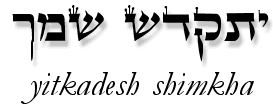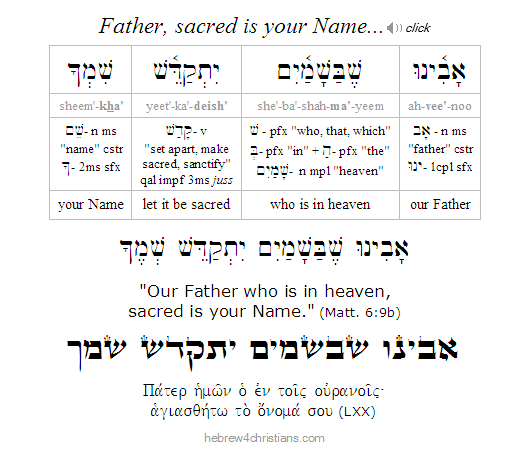|
A Note about the Hebrew and Greek Texts for the LORD's Prayer
The New Testament was written in Koine Greek, of course, and that's the starting point for serious exegesis of its writings. The Hebrew translation used here comes from the Salkinson-Ginsburg Hebrew New Testament (1999 edition) which I compared to F. Delitzsch's older Hebrew translation of the Brit Chadashah as well as with the Robinson-Pierpont Majority Text (1995), the Westcott and Hort NT, and the Friberg NT (UBS3/4). Others have done similar work (i.e., attempting to reconstruct the Hebrew from the Greek), such as Brad Young and David Bivins of the Jerusalem School of Synoptic Research.
The LORD Jesus undoubtedly taught this prayer to His disciples in Hebrew, since Hebrew was the language of the synagogue and temple of His day, and Jesus Himself "made aliyah" by performing Torah readings at the synagogues (Luke 4:16). Jesus also revealed Himself to Paul in Hebrew language during Paul's dramatic conversion experience (Acts 26:14).
The Hebraic mindset informs the intent of the New Testament writers, and we may fall into isogesis if we overlook this foundational truth. In the West we have often imported Greek concepts into the text of Scripture, forgetting that the New Testament documents were all written by Jews who were steeped in Jewish culture. If you need any background information on that idea, I would suggest "Our Father Abraham" by Marv Wilson or Jim Gerrish's book, "Does God Play Favorites?"
In fact there is historical evidence that Matthew wrote his gospel in Hebrew. External evidence for this reaches as far back as Papias of Hierapolis, of the second century CE. Eusebius quoted Papias:
"Matthew collected the oracles in the Hebrew language"
(The Ecclesiastical History, III, XXXIX, 16).
This is corroborated later in the Babylonian Talmud (Shabbat 116a), the Jerusalem Talmud (Shabbat 15c), as well as the Tosefta (Shabbat 13:5), where debate rages concerning the destruction of the scrolls of the New Testament. The question asked was, "Should they be burned since they contain the divine Name (i.e., YHVH)?" This debate clearly documents that the gospel was extant in Hebrew in early church history.
Moreover, Jerome, the translator of the Latin Vulgate (around 400 A.D.) and considered the greatest Hebrew scholar of the late Roman Imperial age, wrote the following in his De Viris Illustribus (Of Illustrious Men):
"Matthew, also called Levi, apostle and aforetimes publican, composed a gospel of Christ at first published in Judea in Hebrew for the sake of those of the circumcision who believed, but this was afterwards translated into Greek though by what author is uncertain. The Hebrew itself has been preserved until the present day in the library at Caesarea which Pamphilus so diligently gathered. I have also had the opportunity of having the volume described to me by the Nazarenes of Beroea, a city of Syria, who use it. In this it is to be noted that wherever the Evangelist, whether on his own account or in the person of our Lord the Savior quotes the testimony of the Old Testament he does not follow the authority of the translators of the Septuagint but the Hebrew. Wherefore these two forms exist, "Out of Egypt have I called my son," and "for he shall be called a Nazarene."
|







